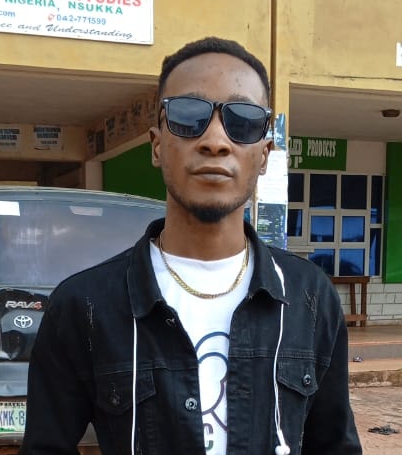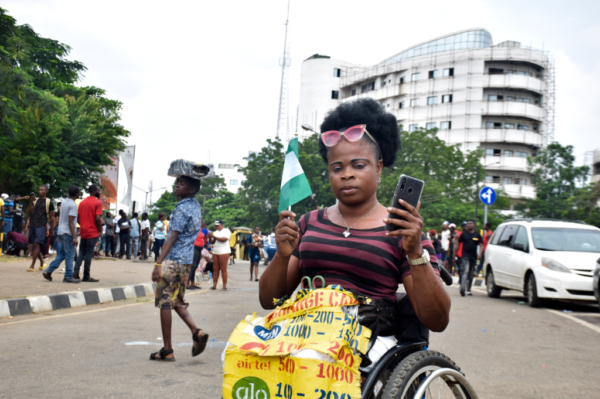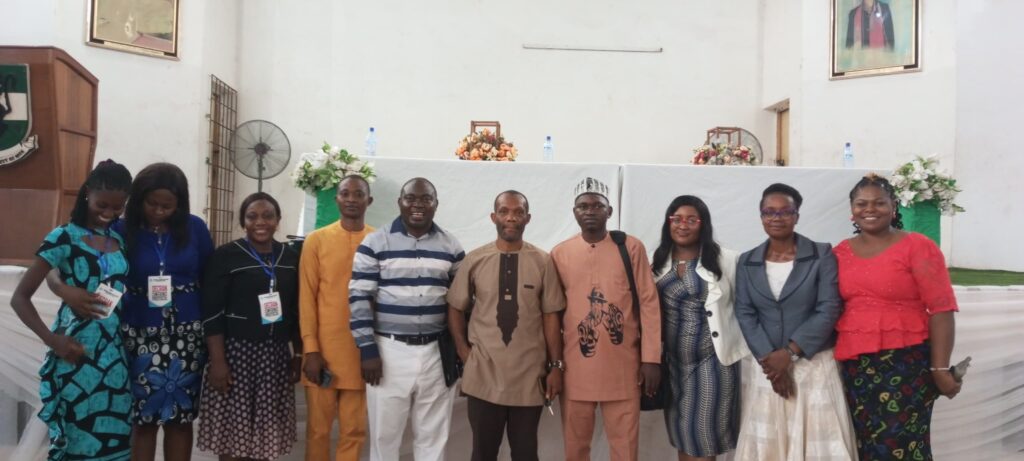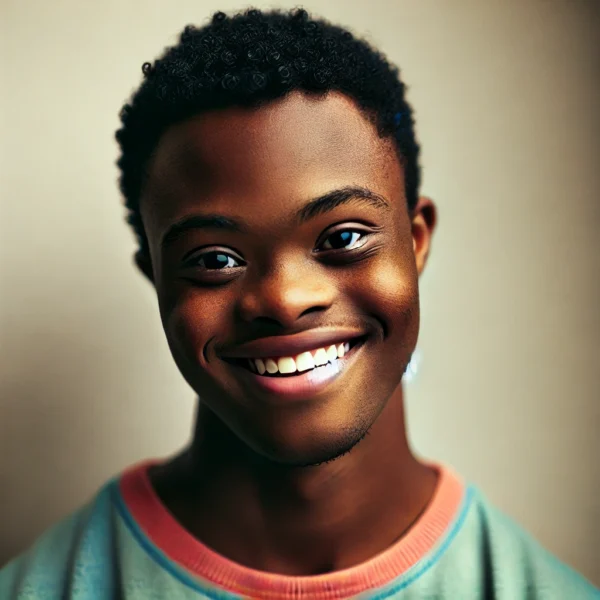Learning at a cost: How Nigeria’s education system frustrates PWDs in tertiary institutions

Mboutidem Godwin Samuel
“God forbid! ‘It can never be me,’ you say, but you forget that life comes with uncertainties—life happens. One day you are whole, hale, and hearty; the next day, it becomes you. Now, what do you do? Hate yourself? Shrink and hide? Cry and spite? Or, better still, embrace the new you?
Just like every able-bodied individual, Godwin never thought that a day would come when daylight would bring him pain, when the chalkboard would look like mist, when he could no longer kick a ball or play hide and seek, when he’d apologize for bumping into people, even as curses were thrown at him for an unintentional mistake—when his eyes would finally shut down in eternal darkness. In his words, ‘If someone had told me that I would become blind, I would have cursed the person.’
However, against the tempestuous tide of blindness sponsored by measles, Godwin swam and has now become a beacon of light, saying he is privileged to be blind. A journalist in the making and a writer, Mboutidem Godwin Samuel, a final-year student of Mass Communication at the University of Nigeria, Nsukka (UNN), shared his story with Crisp Nigeria—all smiles, no regrets. Approved! You can call him Mr. Positive.
How it all began
Godwin’s night began to fall too early. He contracted measles when he was little, and the disease had one mission: to steal his sight.
He recounts, “I contracted measles, and it started affecting my sight. I discovered that when I went to school, I could no longer see the blackboard—things were now tiny for me. When it was sunny, it also affected me. At times, I walked without seeing where I was going. Several times, I would bump into people, and they’d say, “You no dey see?” and I’d apologize. It started gradually until I totally lost my sight.”
Education for all – There’s no leaving Godwin behind
Godwin, an indigene of Akwa Ibom who was born and raised in Calabar, Cross River State, where he attended a special primary and secondary school for the blind, is now a final-year student of Mass Communication at UNN. He sees education as a means for persons with disabilities (PWDs) to live a successful life.
According to him, “As a visually impaired person, education is what you need if you want to be as successful as every other person. People with their sight have better chances of establishing a business and thriving, but as a visually impaired person, you might establish a business, but managing it might be a problem. So, you just have to go to school, and that is the reason why I decided to pursue my degree.”
His typical day as a student requires that he prepares for school earlier than the early bird. After getting ready, Godwin, who resides in the boys’ hostel, makes his way to the roadside to find someone going his way. Unfortunately, most of his classmates live off-campus, so he has to ask random people for assistance until he finds someone going in his direction, which often makes him late for classes and other events. He described this experience as “sorrowful and sad.”
“As a visually impaired student, struggling to compete with the sighted ones is not really easy,” he said. “At times, you might want to go to class, but since you’re limited, you just have to wait for someone. Probably you have a class at 8 a.m., and by 7:30 a.m. you’re prepared, but you still have to wait for someone to guide you to class, and it is not a funny experience.”
Godwin recalls attending classes under the sun and in the rain because shuttles are not allowed everywhere on campus, forcing him to trek.
SEE VIDEO
A not-so-inclusive education
Getting educated isn’t bread and butter, we agree, but for PWDs, twice as much effort is required. However, with the not-so-inclusive educational system in the country, Godwin has had to face many challenges.
The phrase “Education for all” is the bedrock of Sustainable Development Goal 4, which aims to ensure inclusive and equitable quality education and promote lifelong learning opportunities for all. But how inclusive is education in Nigeria for PWDs?
Godwin notes that there is a certain level of equality in access to education at UNN in terms of accepting people living with disabilities to study alongside their non-disabled peers. However, there are instances, such as when a lecturer tells a student with a disability, “You are not meant to be here; you should have your own separate school,” which is, to say the least, inhumane.
For PWDs, being in the same environment as non-disabled people gives a sense of worth and acceptance.” According to the young man, “Talking to others and relating with people like you helps you learn from them, and they learn from you. It makes you feel human, that you aren’t rejected.”
Yes! You must be joking to think that a blind person would see a projected screen. Sadly, this is one of the hurdles that Godwin faces and cannot cope with; however, the lecturer calls the shots. He said, “As visually impaired students, we find it very difficult and can’t cope with that. We deal with hearing instead of seeing.” But who cares?
Note-taking for Godwin is done via recording. He records during class and, after class, makes recordings of another student’s notes for comparison, which has been effective. However, instances where the lecturer uses a projector or writes on the board prove to be a hurdle.
Examinations pose their own problems. At times, PWDs find it difficult to write their exams to their satisfaction because they must write in the way the lecturer stipulates, which their disability may not permit, thereby putting them at a disadvantage.
Rules and regulations are another issue. Most of them do not favor PWDs, as they were not made with them in mind. Godwin disclosed, “I can tell that half of these laws do not favour the physically challenged. If they want to make these laws equitable, they need to bring in experts to see how they can carry others along.”
There are many things that are not right in terms of making education accessible for PWDs, and with a voice of advocacy, Mboutidem Godwin Samuel spoke: “Nigeria is still lagging behind when it comes to inclusive education. There are a lot of things to be done.
“You see a building, a classroom that requires you to climb a staircase. How do you expect someone in a wheelchair to get to that classroom? This makes accessibility difficult.
“So many schools in Nigeria aren’t built to accommodate PWDs. Therefore, the Nigerian government and those in charge of education should come together to create a policy that favors PWDs because Nigeria is still behind in terms of inclusive education.” And he is definitely right.
The issues
According to the United Nations Children’s Fund (UNICEF), there are about 240 million children with disabilities worldwide. Over 32 million Nigerians are persons with disabilities, with most being children. Yet, persons with disabilities are often overlooked in policymaking, limiting their access to education and their ability to participate in social, economic, and political life.
UNICEF also identifies disability as one of the most serious barriers to education across the globe. These barriers stem from discrimination, stigma, and the routine failure of decision-makers to incorporate disability into school services.
READ ALSO
Rising flood incidents in Nigeria: Causes, consequences and solutions
CrispNG Youth of the Month: Meet Adeola, the 19-yr-old breaking barriers in politics
While there are policies targeted at inclusion for PWDs, the reality is that many children with disabilities are not in school. Only a small number of schools are established for PWDs, with just a few being funded by the government. Those who make it to university to earn a degree are not catered to as they should be.
In January 2019, former President Muhammadu Buhari signed into law Nigeria’s first legislation on people with disabilities, the ‘Discrimination Against Persons With Disabilities (Prohibition) Act.’ The law imposes requirements to deliver inclusive education for people with disabilities, supporting their educational and social inclusion rights.
The law stipulates that a person with disability is entitled to free education to secondary school level.
(3) The (Disability) Commission shall provide educational assistive devices.
18. (1) All public schools, whether primary, secondary or tertiary shall be run to be inclusive of and accessible to persons with disabilities, accordingly every school shall have
(a) at least a trained personnel to cater for the educational development of persons with disabilities; and
(b) special facilities for the effective education of persons with disabilities.
(2) Braille, sign language and other skills for communicating with persons with disabilities shall form part of the curricula of primary, secondary and tertiary institutions.
19. The education of special education personnel shall be highly subsidised.
20. Government shall ensure that the education of persons with disabilities, particularly children, who are blind, deaf or with multiple disabilities, is delivered in the most appropriate language, mode and means of communication for the individual, and in environments which maximise academic and social development. However, there is no implementation mechanism, with governance and finance being major barriers.
Nigeria’s 2024 budget for education was set at N1.54 trillion, representing 6.39 percent of the total budget, which is far below the 15 percent recommendation by UNESCO.
Additionally, the National Commission for Persons with Disabilities was allocated only N70 million in the 2024 budget, with N50 million for a national educational intervention program for persons with disabilities and N20 million for a Braille production center to support inclusive education.
This supports the notion that finance is a major constraint in achieving quality education for persons with disabilities.
Changing the narrative
For Godwin, awareness is the key word in fostering change. “Awareness is needed for people to know how to relate to and treat PWDs well. Several times, I’ve witnessed people meeting a PWD and asking, ‘Why are you attending school?’ This is because they lack awareness.”
He also noted that the buildings and environmental terrain need to be considered. PWDs must be taken into account when making building plans. Facilities like ramps and elevators are essential for easy navigation.
He said, “If you really want to ensure that no one is left behind, your system of operation, method of teaching, method of providing materials, and your buildings, etc., should favor every kind of person. Most materials in school are in hard copy; for us, we use soft copies, which is also a problem that should be addressed.
“Additionally, policies should be made to alleviate our burdens, and already existing ones should be implemented; we should also be seen as a priority. If these issues are addressed, I think things will be easier.”
How ASSN is Championing the Cause of PWDs.

It is apparent that access to both physical and financial resources is an issue that persons with disabilities face on campus, with no one to speak for them. They struggle for seats in the classroom, water to bathe and cook with, and many other necessities, and they also spend twice the amount that persons without disabilities spend on education.
To ensure that their rights are protected and their voices are heard, PWDs at UNN unite under the Association of Students with Special Needs, University of Nigeria, Nsukka (ASSN, UNN) to protect their welfare and have made significant progress so far.
“It is not easy; that is why most of us come together to see if we can form an association that will help us reach the school, at least to tell the school we are here and need to be heard. We are basically championing our cause ourselves,” Godwin, who is also the current auditor general and a two-time public relations officer of the association, stated.
Beyond the disability – A blooming journalism career
Mboutidem Godwin Samuel sees his writing prowess as God-given, a passion he developed since primary school. The campus journalist shares, “I received my writing skills as a gift from God. I developed a passion for writing in primary school after reading a series of storybooks. I’ve always wished to be an author one day. I am the kind of reserved person who has a lot to say and wants to be heard. I prefer to write rather than talk because the power of my voice lies in my pen.”
Though an introvert, his journalism training is bringing him out of his shell, as he’s getting more comfortable speaking to people. He says, “I don’t regret choosing this profession. So far, there has been a lot of success. I’ve been able to inform, educate, and entertain many people with my writing skills.
“Anything you want to do in life is all about passion. If you have the passion, that thing will be easy for you, and you will be able to navigate and follow the rest. I don’t want to believe there are limitations, but I think journalism is a good fit for us, and we can cope with it. Hopefully, when I start practicing, I wish to do more than those whose eyesight is unimpaired,” Godwin said.
The perks of tech
The empowerment that technology gives to PWDs cannot be overemphasized. Tech-savvy Godwin is grateful for technology.
According to him, “Technology is a great source of help, especially for visually impaired people, as we use our phones to do everything from reading to taking notes.
“With my laptop, it is very easy to communicate because I can type and print my words out easily instead of using Braille, which may not be understood by most people. People ask me how I cope without my sight, but I tell them that it is not all about seeing; technology has made things so easy. You just have to put in the effort to learn how to use these devices.”
Still on gifted hands: No limitations
Godwin is not holding back. Due to his musical prowess as a fire drummer, he earned the name MBKeys. Currently learning to play the keyboard, he proves that limitation is indeed just in the mind.
MBKeys, as he is fondly called, wears optimism like a second skin. “Going blind is not a choice, and therefore you just have to embrace it if and when it happens,” he said.
“I’m still valuable; I have potential, and I know the world is waiting to hear from me. So, I continue to challenge myself, believing that I can still do it, that I can still become whatever I want to be, and that I can still push forward. Thank God I have technology that aids me in finding ways to achieve my dreams.
“For me, I don’t see anything as a limitation. Limitation is in your mind. If you are certain that you are going to stop, you are going to stop; if you are determined to move forward, you will move forward. It’s all about determination, passion, and willingness.
“Accepting who you are and what you are is crucial. I think accepting yourself is what really matters because a lot of people become sad because they can’t accept themselves. If you do not accept yourself, how then do you expect others to accept you? It’s all about accepting your condition and looking for ways to strive forward and not be a liability.”




